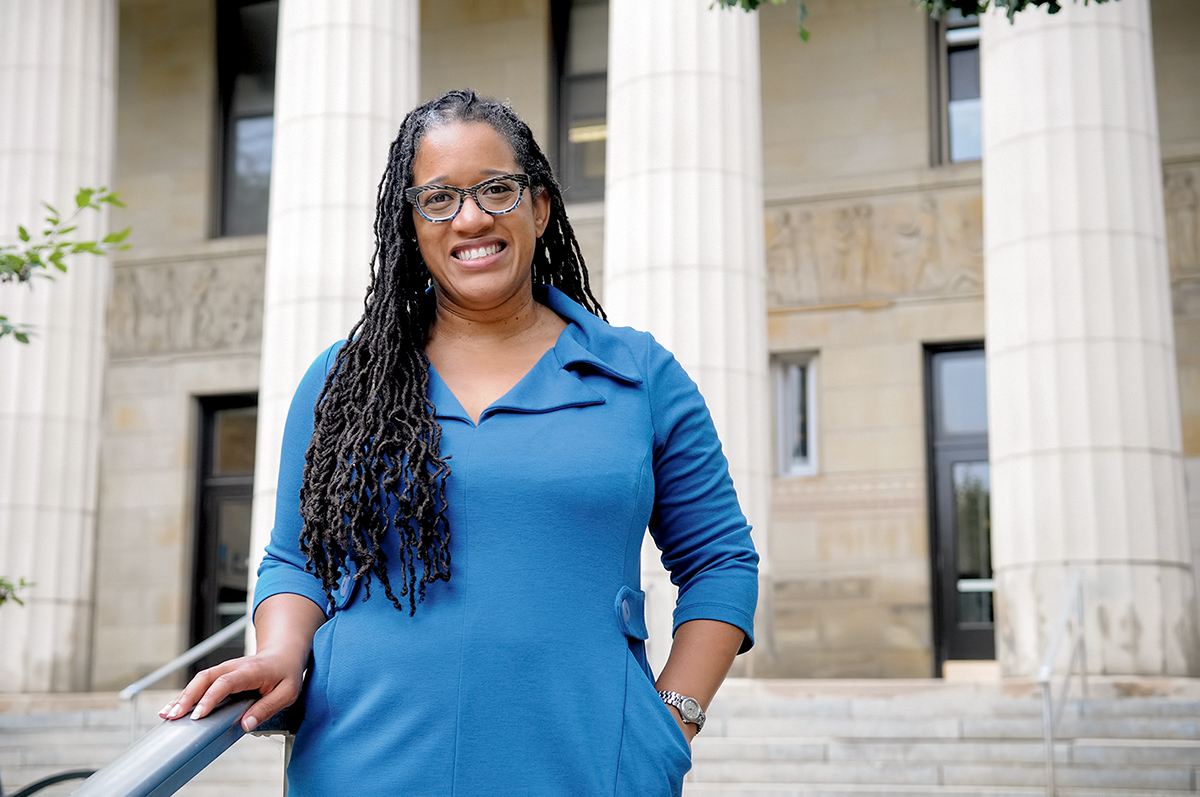As a college student, Tania Mitchell was given an opportunity to replace an assignment for a 20-page paper with 20 hours of service. She jumped at the chance.
At the Kate Ross Homes in Waco, Texas, Mitchell worked with single moms doing after-school projects with their kids. It would have been faster and easier to write the paper, but the experience changed her life.
“Concepts I was learning in the classroom came to life,” she says. “That’s when I first became enamored with the opportunity that community service—and then service learning—provides for students and communities.”
Today Mitchell is an assistant professor of higher education whose interests include community engagement and service learning, civic identity, and civic discourse. She is especially interested in how the college years can make good on the promise to transform lives and create active, engaged citizens.
What she’s found is striking. For example, only 36.4 percent of eligible voters across the nation voted in the 2014 midterm elections. The voter turnout was 40 to 60 percent among those with some college to post-graduate education. It was nearly 80 percent among the alumni in Mitchell’s most recent study.
Mitchell’s research looks specifically at civic learning programs that involve students through a cohort model in service over one to three years. That provides time for students to get a variety of experience in the organizations where they serve, and they do. A student who works in a soup kitchen, for example, probably starts on the line serving soup to clients. Then they learn to do other duties. Eventually their work in communities challenges them to ask questions like, “What are the structural issues that create the need for a soup kitchen in the first place?” and, “If the soup kitchen doesn’t address that structural issue, what else should we be doing?”
“They are making the personal professional,” she explains. “Now you have adults acting in all those ways intended.”
Her data shows a strong return on the investment in classroom and community. Voting behavior is just the tip of the iceberg.
More than 80 percent of the alumni in her study reported participating in some form of community service at least monthly, while 26 percent of all citizens do. More than 90 percent said their civic learning program in college had an impact on their career, and 76 percent are working in the nonprofit or public sectors.
“Universities are the optimal place to create these citizens,” says Mitchell. “Shouldn’t we all want to make these investments in our students and our democracy?”
Serving with purpose
In Mitchell’s own life, there were elements of service before college. Growing up in San Antonio, her grandmother took her door-knocking to register people to vote. Holiday shopping in her family also meant shopping for an extra family. She joined a community service club in high school.
“But college is where I got invested in community work and wanting to see how I could make a contribution,” she says.
Soon she took on not only service roles but also leadership in such opportunities as alternative spring break, where students spend their spring breaks volunteering.
Mitchell went on to graduate school in Indiana and Massachusetts, where her interest in student development deepened. She wrote her dissertation on a multi-term, service-learning program with a cohort of 10 undergraduates, whom she followed for two years. As an academic administrator at Stanford University, she spent five years leading an innovative program-based service-learning and community engagement initiative for the Center for Comparative Studies in Race and Ethnicity. Her desire to know what happened to the 10 undergraduates in her dissertation research led her to develop a study of alumni that included programs at three institutions and 195 individuals.
She was spurred on by a national report, “Advancing Civic Learning and Engagement in Democracy: A Road Map and Call to Action,” from the U.S. Department of Education in January 2012—the 150th anniversary year of the first Morrill Act, which led to the founding of the first public land-grant universities. The report linked high-quality civic learning with increased retention and completion rates, a stronger workforce, and safeguarding democracy.
It called on higher education, as well as elementary and secondary schools, to “expand and transform their approach to civic learning and democratic engagement.”
“The report said we have to stop tinkering at the margins,” Mitchell recalls. The phrase stuck with her.
Later in 2012 Mitchell joined the University of Minnesota, where she continues to deepen her teaching and expand her research as an internationally recognized and award-winning scholar. She acknowledges that her perspective has become more critical over time.
“I want us to move away from the idea that service is good just because it’s service,” she says. “We need to be intentional, and we need to care as much about the outcomes for the community that is served as we care about the outcomes for the students doing the service.”
That, too, is good citizenship.
Read more about Tania (Tuh-NEE-ah) Mitchell and her work on her faculty page.
Story by Gayla Marty | Photos by Dawn Villella | Fall 2016
